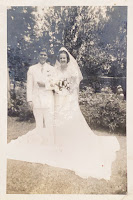In this post, I point out features of literature that attend to the trope of going into the woods.
- The woods are a dark and scary place in fairy tale legend. Out of a tale in Grimm's stories, Carol Anne is sucked through her TV into the Otherworld in In Poltergeist
. The woods lie at a space between goodness and evil, light and dark, good and nice, deception and honesty, justice and wrong. In the woods, characters are inextricably changed forever. Lucy in C.S. Lewis's novel The Lion, the Witch, and the Wardrobe
enters through a wardrobe, not so scary as a monster television, into a wood called Lantern Waste in Narnia. She meets a friendly faun and is forever changed; she becomes a queen, rules the land, but returns back through the wardrobe to the real world, restored to a little girl once again. But, the woods can be simply a place of an obstacle, like Hagrid, the hefty groundskeeper in the Harry Potter series, leads his pupils into the woods to accomplish the task of pulling out mandrakes from the soil, or learning to tame a hippogriff. As a side note: in the film, we get to see the CGI splendor Harry in flight and Malfoy's almost fatal encounter with the creature. In the woods there are fauns, giants, monsters, vampires, wolves, fauns, and humans too. In "woods" stories, the hero undergoes countless obstacles, like Odysseus on his twenty years journey -- a long woods moment -- he didn't want to leave his family and son to fight in Troy, similar to our young men fighting in Iraq or Afghanistan. Odysseus is us. We didn't ask for the odyssey of crazy, absurd adventures, asked to eat of the Lotus flower, which makes us forget the purpose of the journey - to return home. And Odysseus does return home, eventually, restoring his home, wresting it from the inhospitable hands of the suitors.
- The woods are like portals. In Celtic mythology, the woods are cracks in the space/time continuum, as in the Subtle Knife
(His Dark Materials, Book 2) by Philip Pullman; the protagonist Will slices through London air with a magical knife to enter another world. Going through the woods, we leave our world for a time, to return, changed. Like Thomas Covenant Unbeliever, in Stephen R. Donaldson's epic fantasy saga
about a man ridden with leprosy in our world, crosses over into an otherworld (The Land) and appears as a powerful warrior.
- A popular woods motif is taken from William Shakespeare's Midsummer Night's Dream: young lovers run away into the woods, only to be shaken up by the fairy boy Puck who daubs lotion into their eyes, switching identities, transformations are made, all hell breaks loose (don't you get confused reading this story?). I still cannot remember who fits with who in the Hermia, Lysander, Demetrius, Helena quadrangle. One thing is for sure: a guy gets turned into an ass and Helena is quite a dog! It is in the woods chaos reigns. The woods lie at boundary lines; we enter into the woods, and come out again, back into life.





















